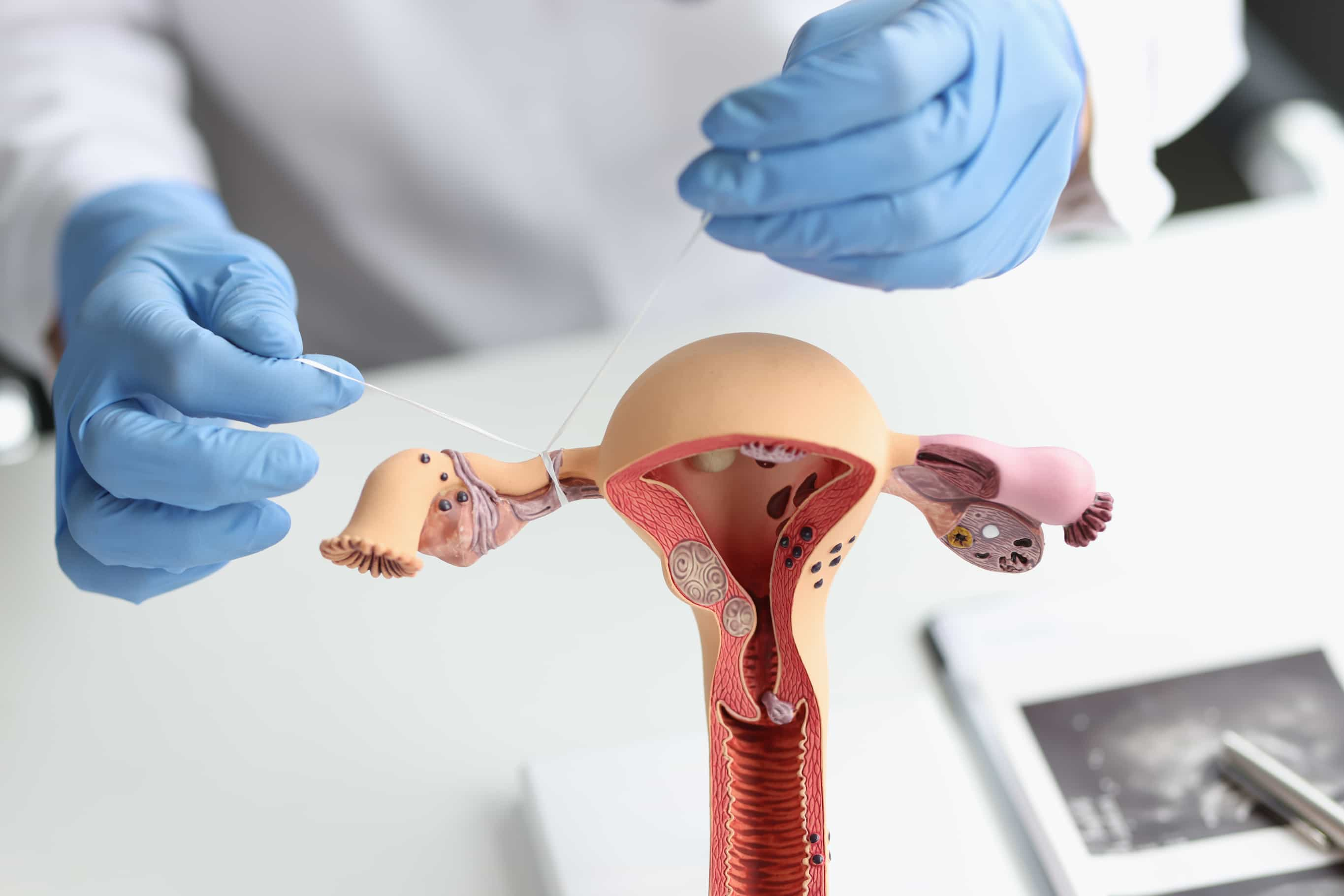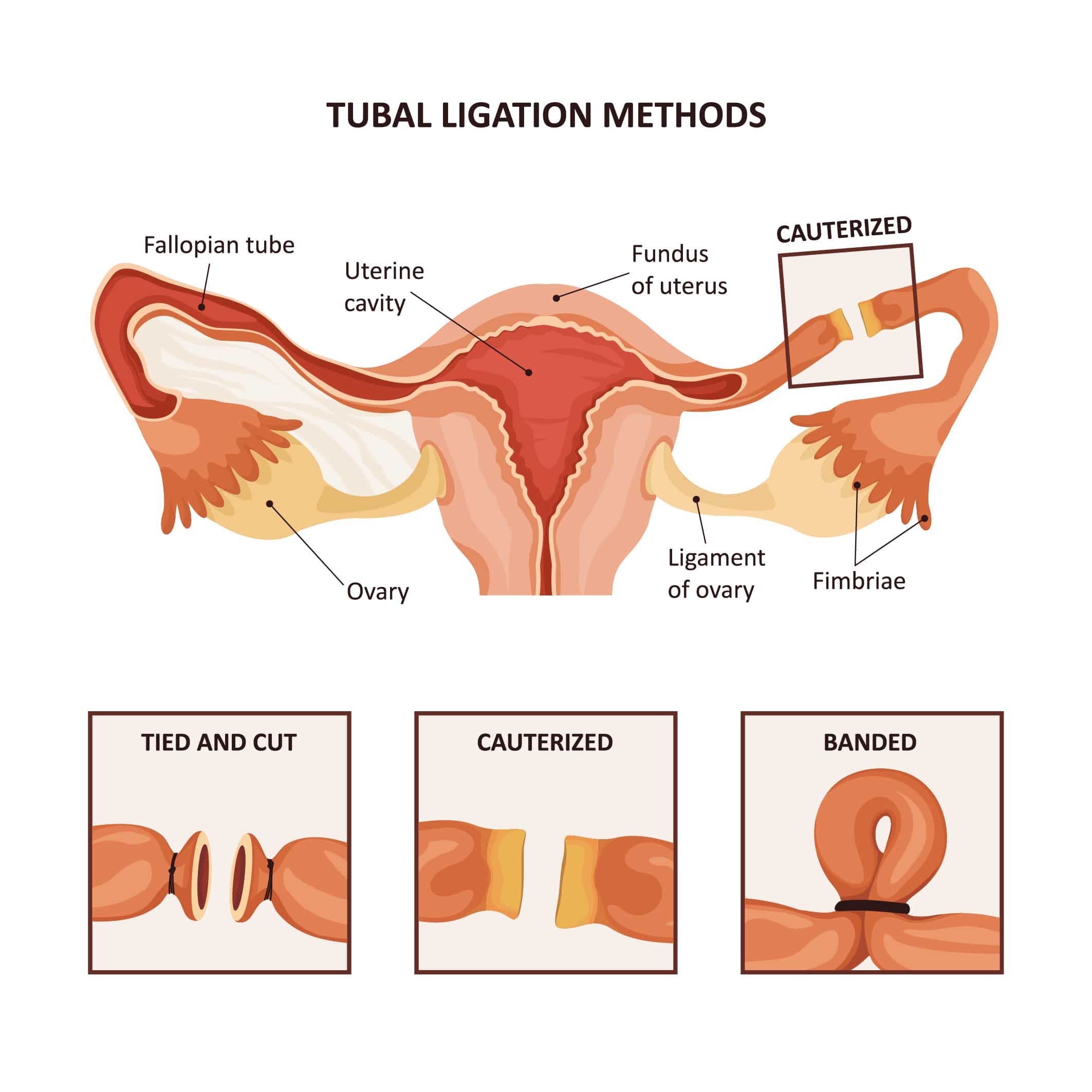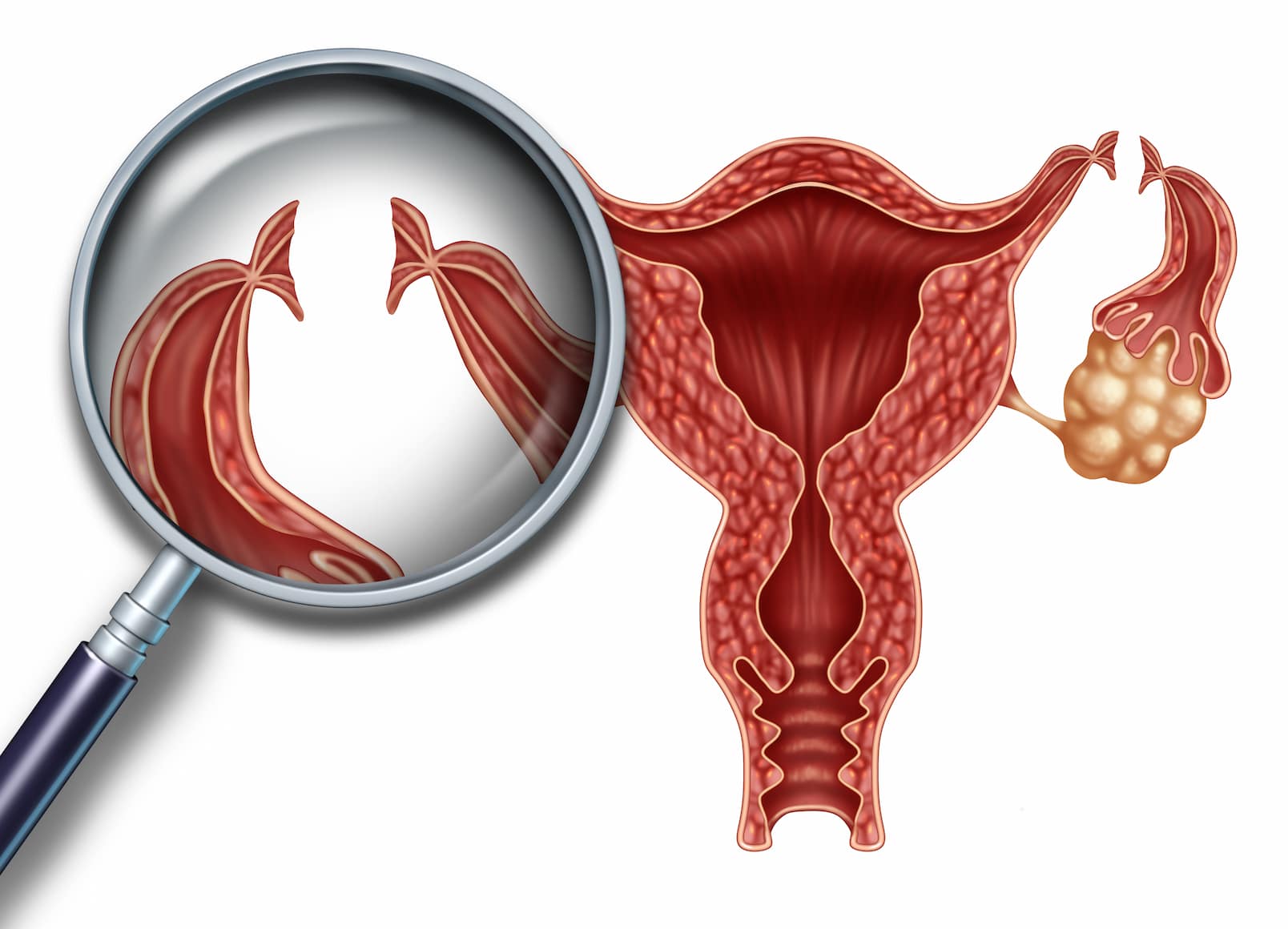Tubal Ligation in Turkey
- Medical Treatment
- Ob-Gyn Treatment in Turkey
- Hysterectomy in Turkey
- Cervical Cyst Removal in Turkey
- Dilation and Curettage in Turkey
- Exploratory Laparotomy in Turkey
- Hysteroscopy in Turkey
- Myomectomy in Turkey
- Ovarian Cyst Removal in Turkey
- Tubal Ligation in Turkey
- Gynecology in Turkey
- Oophorectomy in Turkey
- Colposcopy in Turkey
- Cystoscopy in Turkey
- Laparoscopic Hysterectomy Surgery in Turkey
- Tubal Ligation Reversal in Turkey
- Homepage
- Medical Treatment
- Tubal Ligation in Turkey

About Tubal Ligation in Turkey
Tubal ligation in Turkey, commonly referred to as “getting your tubes tied,” is a surgical procedure that’s very effective in preventing pregnancy. It is also called a female sterilization. Tubal ligation in Turkey involves cutting, blocking, or sealing off your fallopian tubes to prevent your eggs from being fertilized by sperm. The term “tubal” refers to the fallopian tubes and “ligation” means to tie. Your fallopian tubes are cut and tied with a special thread (suture) or blocked during this sterilization method using a clamp, clip, or band.
Women's reproductive system includes the vagina, uterus, fallopian tubes, and ovaries. The fallopian tubes are on either side of the uterus and extend toward the ovaries. These tubes receive eggs from ovaries and transport them to the uterus. Sperm can no longer reach the egg so an egg can’t reach sperm when the fallopian tubes are closed. This prevents her from becoming pregnant.
With Healthy Türkiye, tubal ligation can be performed after vaginal childbirth or a Cesarean delivery (C-section), during another abdominal surgery or on its own. Tubal ligation can be difficult and expensive to reverse. It shouldn't be remembered, that tubal ligation doesn’t protect against sexually transmitted infections (STIs).

Tubes Tied in Turkey
Tubes tied in Turkey is a procedure that permanently prevents pregnancy. Unlike a hysterectomy procedure, it doesn’t prevent ovulation or menstruation. It’s a generally safe and effective procedure for most women.
Tubes tied Turkey is a surgical procedure that involves cutting or blocking the fallopian tubes to prevent eggs and sperm from meeting.
Tubal ligation is sometimes confused with hysterectomy, but they’re truly different. When you have a partial hysterectomy, your uterus is removed, and you’ll continue to ovulate, but will be unable to carry a child. Also, a complete hysterectomy involves removing your uterus and ovaries, which prompts immediate menopause. However, after a tubal ligation, ovulation and menstruation continue until menopause naturally occurs.
There are a lot of different reasons why a woman might choose to get tubal ligation in Turkey. You may want to have sex without worrying about getting pregnant, you might not want to deal with the side effects of hormonal birth control or getting pregnant might put your health in danger.
Prepare for Tubal Ligation in Turkey
Before you have a tubal ligation in Turkey, your doctor will talk to you about your reasons for wanting sterilization. Together, you can discuss factors that could make you regret the decision, such as a young age or a change in marital status. Your doctor will also review the following with you:
Risks and advantages of reversible and permanent methods of contraception
Reasons and probability of sterilization failure
Methods to prevent sexually transmitted infections
The best time to do the tubal ligation procedure — for instance, shortly after childbirth or in combination with another abdominal surgery, like a C-section
If you're not having a tubal ligation shortly after childbirth or during a C-section, you can consider using contraception for at least one month before the procedure and continue using a reliable form of contraception until your tubal ligation procedure is performed.

We Care About Your Health
Healthy Türkiye provides the best for your health and comfort. You will feel privileged with us.
7/24 Quality Personal Assistance Throughout Your Journey
Customizable for You All-Inclusive Packages
Get the Right Advice for your Health
How is Tubal Ligation Performed in Turkey?
Your fallopian tubes are cut and tied with special thread, closed shut with bands or clips or sealed during tubal ligation. It can be performed in 3 ways:
Laparoscopic Tubal Ligation in Turkey
Laparoscopy enables your doctor to complete tubal ligation by making two small incisions — one at your navel and one just above your public bone.
Firstly, an intravenous line (IV) will be inserted into a vein in your hand or arm. Probably, you’ll be given a general anesthetic in the IV to relax your muscles and prevent pain during surgery.
Then, a small incision is then made near your navel. A laparoscope, a thin viewing tube about the width of a pencil, is passed through this slit, and your abdomen is inflated with carbon dioxide to make your organs easier to view.
After, they insert a surgical instrument through a second small incision made at your pubic hairline. Your fallopian tubes are located and then sealed with a band, ring or a clip. Sometimes, your doctor will use an electric current, called electrocoagulation, to seal your fallopian tubes.
Finally, your doctor seals your fallopian tubes, removes the laparoscope, and uses dissolvable stitches to close the incisions.
Laparoscopic tubal ligation in Turkey is typically done as an outpatient procedure and can be performed at any time. The smaller incisions reduce recovery time after the procedure and the risk of complications. In most cases, you can leave the surgery facility within 3-4 hours after laparoscopy.
Laparotomy in Turkey
A laparotomy in Turkey is a more extensive procedure that requires a larger abdominal incision and sometimes a day or two of recovery in the hospital. Your doctor will make a two- to five-inch incision in your abdomen, then bring your fallopian tubes up through the incision. Next, your tubes are cut and closed off using bands, rings or clamps. Finally, your doctor closes your abdomen with stitches.
As this is an open abdominal surgery, the recovery time may take several weeks. Generally, this form of tubal ligation is considered invasive compared to more recent practices, except when it occurs after a C-section delivery. In a c-section case, your doctor uses the same incision to deliver your baby and perform a tubal ligation.
Mini-laparotomy Tubal Ligation (Mini-lap) in Turkey
Unlike a laparotomy procedure, a mini-laparotomy uses a smaller incision — this is why it’s given the name “mini” laparotomy. This kind of tubal ligation is typically done within 24 hours of a vaginal childbirth when you’re already under epidural anesthesia. But, it can also be done under spinal anesthesia if you didn’t receive an epidural during labor.
After you give birth, your doctor locates your fallopian tubes and uterus just below your navel. If a doctor performs a mini-lap outside of childbirth, they make the incision just above your public bone.
Your doctor locates your fallopian tubes, lifts them to the incision, and closes them off using a special thread (suture). If the procedure isn’t related to childbirth, your doctor may use bands, rings, or clamps. Finally, the incision will be closed with stitches that dissolve.
Recovery from Tubal Ligation in Turkey
If you’ve had a laparoscopic tubal ligation, you can be allowed to go home within a few hours. If you’ve had a mini-laparotomy or laparotomy, you may need to stay in the hospital overnight. If you get your tubes tied after giving birth, you’ll already have planned a clinic stay.
Some common restrictions you can expect after a tubal ligation are:
You should avoid lifting anything heavy for at least one or two weeks. If you gave birth just before your tubal ligation, it’s generally recommended to wait at least four weeks to lift anything heavier than your baby.
Don’t drink alcohol or drive for at least 24 hours.
Gas in your abdomen can cause discomfort in your neck, shoulders, and chest for 24 to 72 hours after surgery. You can take a warm shower, use a heating pad, or walk.
You may have mild nausea. Try eating a light evening meal on the day of surgery; herbal tea, soup, toast, or crackers may help relieve nausea.
Vaginal bleeding up to one month after tubal ligation is typical. Many women don’t have their next normal menstrual cycle for four to six weeks after surgery. When your normal cycle returns, you can notice heavier bleeding and more discomfort than usual.
Tubal Ligation Reversal in Turkey
A woman usually chooses ligation if they are sure that they do not want to have children in the future, but circumstances can change.
Tubal ligation can sometimes be reversed, but this is not always successful. Success rates depend on the age of the person having the reversal, and the way in which the tubal ligation was performed. If the fallopian tubes were removed, this can't be reversed, although IVF is possible.
For tubal ligation reversal in Turkey, the fallopian tubes are reached through a cut in the abdomen and the surgeon re-joins the cut tubes using very small stitches.
Mostly, the chance of getting pregnant after the reversal of tubal sterilization is about 60%, with about 50% having a baby after a reversal procedure.
The risk of ectopic pregnancy after a successful reversal procedure is quite high. This reason is scar tissue can stop the fertilized ovum from moving down the fallopian tube.

2026 Cost of Tubal Ligation in Turkey
All types of medical attention like Tubal ligation are very affordable in Turkey. Many factors are also included in determining the cost of Tubal ligation in Turkey. Your process with Healthy Türkiye will last from the time you decide to have a Tubal ligation in Turkey until the time you are fully recovered even if you are back home. The exact Tubal ligation cost in Turkey depends on the type of operation involved.
The cost of Tubal ligation in Turkey does not demonstrate many variations in 2026. Compared to costs in developed countries like the United States or the UK, Tubal ligation costs in Turkey are relatively low. So, it's no wonder patients from across the world visit Turkey for Tubal ligation procedures. However, the price is not the only factor affecting choices. We suggest looking for hospitals that are safe and have Tubal ligation reviews on Google. When people decide to seek medical help for Tubal ligation, they will not only have had low-cost procedures in Türkiye, but also the safest and best treatment.
At clinics or hospitals contracted with Healthy Türkiye, patients will receive the best Tubal ligation from specialist doctors in Turkey at affordable rates. Healthy Türkiye teams provide medical attention Tubal ligation procedures and high-quality treatment to patients at a minimum cost. When you contact Healthy Türkiye assistants, you can get free information about the cost of Tubal ligation in Turkey and what this cost covers.
Why Is Tubal Ligation Cheaper in Turkey?
One of the main considerations before traveling abroad for Tubal ligation is the cost-effectiveness of the whole process. Many patients think that when they add flight tickets and hotel expenses to their Tubal ligation costs, it will become very expensive to travel, which is not true. Contrary to popular belief, round-trip flight tickets to Turkey for Tubal ligation can be booked very affordably.
In this case, assuming you are staying in Turkey for your Tubal ligation, your total travel expense of flight tickets and accommodation will only cost less than any other developed country, which is nothing compared to the amount that you are saving.
The question “Why is tubal ligation cheaper in Turkey?” is so common among patients or people simply curious about getting their medical treatment in Turkey. When it comes to Tubal ligation prices in Turkey, there are 3 factors allowing cheaper prices:
The currency exchange is favorable for whoever looking for Tubal ligation has a euro, dollar, or pound;
The lower cost of living and cheaper overall medical expenses such as Tubal ligation;
For Tubal ligation, incentives are given by the Turkish Government to medical clinics working with international clients;
All these factors allow for cheaper Tubal ligation prices, but let’s be clear, these prices are cheaper for people with strong currencies (as we said, euro, dollar, Canadian dollar, pound, etc).
Every year, thousands of patients from all over the world come to Turkey to get Tubal ligation. The success of the healthcare system has increased in recent years, especially for Tubal ligation. It’s easy to find well-educated and English-speaking medical professionals in Türkiye for all kinds of medical treatment such as Tubal ligation.

Why Choose Turkey for Tubal Ligation?
Turkey is a common choice among international patients seeking advanced Tubal ligation. Turkey’s health procedures are safe and effective operations with a high success rate like Tubal ligation. The increasing demand for high-quality Tubal ligation at affordable prices has made Turkey a popular medical travel destination. In Turkey, Tubal ligation is performed by highly experienced and trained doctors with the most advanced technology in the world. Tubal ligation is done in Istanbul, Ankara, Antalya, and other major cities. The reasons for choosing Tubal ligation in Turkey are as follows:
High-quality hospitals: Joint Commission International (JCI) accredited hospitals have dedicated Tubal ligation units that are specially designed for patients. International and national strict protocols provide effective and successful Tubal ligation for patients in Turkey.
Qualified experts: The expert teams include nurses and specialist doctors, together to carry out Tubal ligation according to the patient's needs. All the included doctors are highly experienced in performing Tubal ligation.
Affordable price: The cost of Tubal ligation in Turkey is affordable compared to Europe, the USA, the UK, Singapore, Australia, etc.
The high success rate: Highly experienced specialists, the best available technology, and stringently followed safety guidelines for post-operative care of the patient, resulting in a high success rate for Tubal ligation in Turkey.
Is Tubal Ligation Safe in Turkey?
Did you know Turkey is one of the most visited destinations for Tubal ligation in the world? It is ranked one of the most visited tourist destinations for Tubal ligation. Over the years it has also come to be a very popular medical tourism destination with many tourists coming in for Tubal ligation. There are so many reasons why Turkey stands out as a leading destination for Tubal ligation. Because Turkey is both safe and easy to travel to with a regional airport hub and flight connections to pretty much everywhere, it is preferred for Tubal ligation.
The best hospitals in Turkey have experienced medical staff and specialists who have performed thousands of medical services such as Tubal ligation. All procedures and coordination related to Tubal ligation are controlled by the Ministry of Health in accordance with the law. Over many years, the greatest progress in medicine has been observed in the field of Tubal ligation. Turkey is known among foreign patients for its great opportunities in the area of Tubal ligation.
To emphasize, besides the price itself, the key factor in selecting a destination for Tubal ligation is certainly the standard of medical services, the hospital staff’s high expertise, hospitality, and the safety of the country.
All-Inclusive Package for Tubal Ligation in Turkey
Healthy Türkiye offers all-inclusive packages for Tubal ligation in Turkey at much lower prices. Extremely professional and experienced doctors and technicians carry out high-quality Tubal ligation. The cost of Tubal ligation in European countries can be quite expensive, especially in the UK. Healthy Türkiye provides cheap all-inclusive packages for a long and short stay of Tubal ligation in Turkey. Because of many factors, we can provide you with many opportunities for your Tubal ligation in Turkey.
The price of Tubal ligation differs from other countries due to medical fees, staff labor prices, exchange rates, and market competition. You can save much more in Tubal ligation compared to other countries in Turkey. When you purchase Tubal ligation all-inclusive package with Healthy Türkiye our healthcare team will present hotels for you to choose from. In Tubal Ligation travel, you will have the price of your stay included in the all-inclusive package cost.
In Turkey, when you purchase Tubal ligation all-inclusive packages through Healthy Türkiye, you will always receive VIP transfers. These are provided by Healthy Türkiye, which is contracted with highly qualified hospitals for Tubal ligation in Turkey. Healthy Türkiye teams will organize everything about Tubal ligation for you and have you picked up from the airport and safely brought to your accommodation. Once settled in the hotel, you will be transferred to and from the clinic or hospital for Tubal ligation. After your Tubal ligation has been successfully completed, the transfer team will return you to the airport in time for your flight home. In Turkey, all packages of Tubal ligation can be arranged upon request, which relaxes the minds of our patients.
The Best Hospitals in Turkey for Tubal Ligation
The best hospitals in Turkey for tubal ligation are Healthy Türkiye, Memorial Hospital, Acıbadem International Hospital, and Medicalpark Hospital. These hospitals attract patients from all over the world seeking tubal ligation due to their affordable prices and high success rates.
Best Doctors and Surgeons in Turkey for Tubal Ligation
The best doctors and surgeons in Turkey for tubal ligation are highly skilled professionals who offer specialized care and advanced procedures. With their expertise and state-of-the-art techniques, these specialists ensure that patients receive high-quality tubal ligation and achieve optimal health results.

Frequently Asked Questions
Following surgery, some individuals may encounter challenges or experience a burning sensation when attempting to urinate.
Despite the closure of the fallopian tubes, your body will still undergo the ovulation process, releasing an egg. The released egg will either diminish in size or disintegrate, eventually being absorbed by your body.
A salpingectomy involves the removal of one or both fallopian tubes, addressing specific medical conditions and reducing the risk of ovarian and breast cancers. Tubal ligation, on the other hand, permanently blocks the fallopian tubes to prevent pregnancy. Both procedures serve as contraceptive methods with over 99% effectiveness.
Tubal ligation boasts over 99% effectiveness in preventing pregnancy, and it is considered a permanent method of contraception.
Tubal ligation can be performed either during childbirth or shortly afterward. Consult with your doctor or nurse for detailed information.
It is generally advisable to wait approximately a week before engaging in sexual activity after tubal ligation. If the procedure is performed post-childbirth, adhere to the postpartum sex resumption guidelines, typically around six weeks or upon clearance from your healthcare provider.
While ovulation continues, the inability to carry a child remains.
Yes, the risk of contracting sexually transmitted infections (STIs) still exists. Utilizing condoms provides the most effective means of reducing the likelihood of infection transmission or acquisition.
